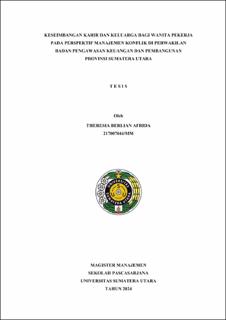Keseimbangan Karir dan Keluarga bagi Wanita Pekerja pada Perspektif Manajemen Konflik di Perwakilan Badan Pengawasan Keuangan dan Pembangunan Provinsi Sumatera Utara
Balancing Career and Family for Working Women Perspectives on Conflict Management in The Representative Office of The Financial and Development Supervisory Agency of North Sumatra Province

Date
2024Author
Afrida, Theresia Berlian
Advisor(s)
Lumbanraja, Prihatin
Absah, Yeni
Metadata
Show full item recordAbstract
Female workers who juggle responsibilities in both their jobs and households
often encounter conflicts in fulfilling their roles, potentially resulting in
organizational discord within their workplace. This necessitates adept
management from both the individual and organizational viewpoints. This study
seeks to analyze conflicts and their management through dual lenses: role conflict
as perceived by working women and organizational conflict from the
organizational standpoint. Employing a qualitative approach with a descriptive
fi·amework, the research utilizes in-depth interviews and documentary analysis to
gather insights from key informants, including female employees, direct
supervisors, and supporting personnel. Data analysis employs an interactive
model, unraveling multifaceted aspects of the phenomenon. Despite concerted
efforts by working women to achieve equilibrium, challenges persist. While social
support from family, partners, and colleagues serves as a catalyst, discordant
perceptions among partners and colleagues pose obstacles. The organizational
perspective on role conflict is delineated through two distinct lenses: that of direct
supervisors and field employees. While direct supervisors perceive minimal
impact of role conflict on departmental and organizational performance, field
employees associate it with feelings of envy, reluctance, task delegation, and
operational impediments arising from fluctuating team dynamics. Organizational
resilience is evidenced through effective communication channels irrespective of
hierarchical boundaries and knowledge dissemination among leaders regarding
employee pro.files and conflict resolution strategies. Nonetheless, disparities in
personal circumstances and employee issues impede the establishment of
standardized treatment protocols. Organizational conflict mitigation strategies
encompass persuasive and collaborative leadership styles, transparent
communication channels with employees, and a collaborative approach to conflict
resolution and compromise.
